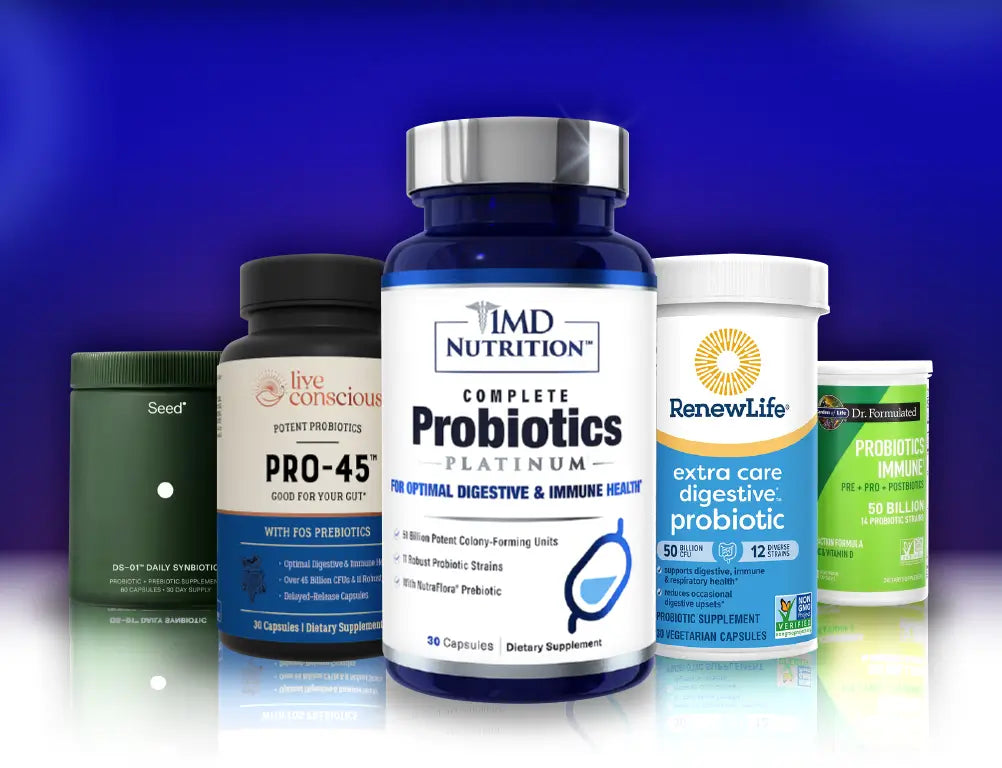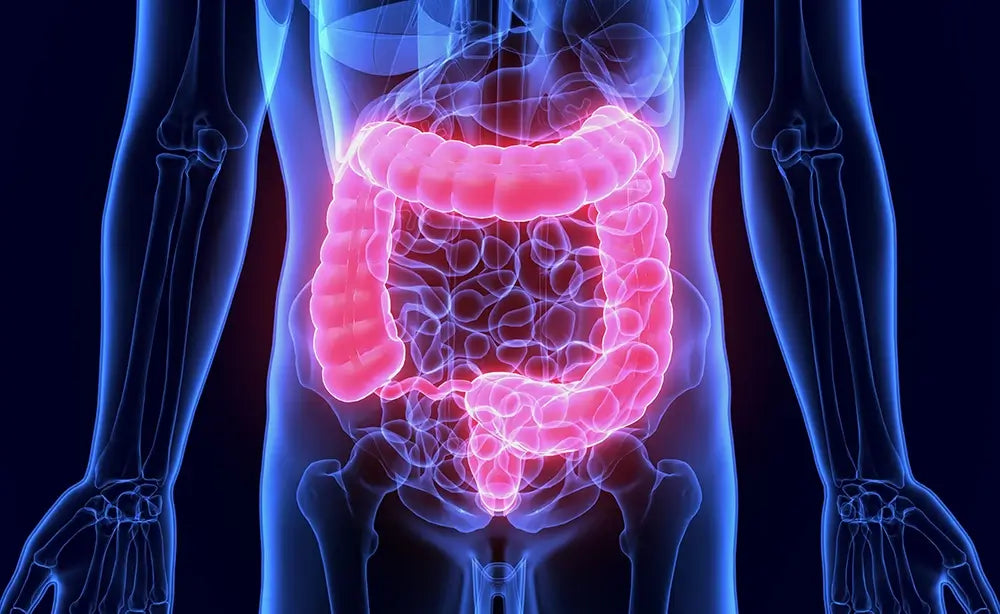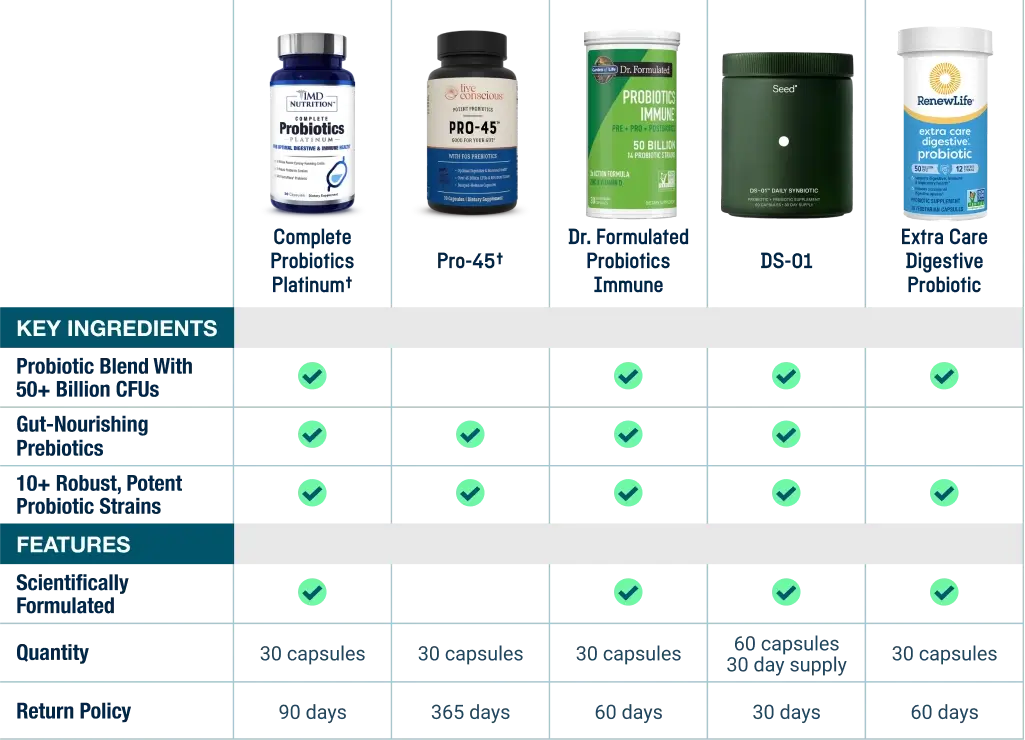Advertising Sponsored by the sellers of 1MD Nutrition® Complete Probiotics Platinum® and Live Conscious® Pro-45®.
5 Essential Probiotics for Optimal Gut Health
Discover the science behind 2024’s must-have probiotics
In today's health-conscious world, probiotics offer a comprehensive and science-backed solution to promoting proper and consistent digestion.
These live microorganisms are recognized for their ability to restore balance in the gut and alleviate common and uncomfortable digestive issues. They work synergistically to enhance nutrient absorption and strengthen the immune system.
As more people seek naturally sourced remedies for their health, probiotics have emerged as a powerful solution for achieving optimal wellness and vitality.
Benefits of Probiotics
The gut microbiome plays a crucial role in maintaining gut health, helping break down hard-to-digest foods, and inhibiting the adherence of bacteria to the intestinal walls, which can go a long way to maintaining a healthy immune response.
There are several factors that contribute to probiotics’ beneficial effects. One is a diverse range of probiotic strains, which play a key role in promoting a healthy gut.
Different probiotic strains have different mechanisms-of-action. Research suggests that probiotics formulated with a diverse range of strains may have a greater impact on gut health.
When shopping for probiotics, look for formulations that contain 10 or more strains to ensure you're giving your gut the best support possible.
Another important component of quality probiotics is prebiotics, which are essentially “food” for probiotics.
Inulin, for example, is a common prebiotic fiber; but it’s one that our bodies cannot break down without the help of probiotics. Beneficial gut bacteria help ferment inulin, working together to support a balanced microbiome.
Just as you have your favorite foods, the bacteria in your gut require certain foods to thrive. In order to function efficiently, specific nutrients are needed to keep your gut health in exceptional shape.
To supplement a healthy diet, you can easily incorporate gut-healthy, prebiotic-rich foods into your daily routine by choosing a high-quality probiotic that already includes beneficial prebiotics.
So, which strains should you look for in your probiotic supplement? Our advice? Diversify!
Here's a short list of key probiotic strains we love — with a prebiotic thrown in!
Key Probiotic Strains
L. rhamnosus
Lactobacillus rhamnosus belongs to the Lactobacillus genus of probiotic bacteria. This particular strain has been studied for its potential to promote digestive health and improve immune function, along with supporting skin health and weight management.
B. lactis
Bifidobacterium lactis has not only been shown to promote a balanced gut microbiome by aiding the absorption of various vitamins and minerals but has also been associated with having a positive impact on respiratory health.
B. lactis may improve the function of immune cells that play a vital role in defending the body against environmental threats.
In addition, some studies suggest that B. lactis may aid individuals with bowel concerns by reducing symptoms.
L. salivarius
Lactobacillus salivarius supports oral health by inhibiting the growth of bacteria in the mouth. This can lead to healthy gums, strong teeth, and improvements in the presence of plaque and probing pocket depths.
L. salivarius also has the ability to produce a small amount of hydrogen peroxide (H2O2) and may help reduce the presence of bad breath.
In addition to its oral health benefits, L. salivarius has positive effects on gastrointestinal health. Some research suggests that L. salivarius may help minimize some symptoms of common gastrointestinal discomfort.
B. longum
Bifidobacterium longum promotes the activity of immune cells, such as T cells, which defend the body. It has also shown promise in promoting mental well-being by reducing cortisol output as it relates to common stressors.
Prebiotic Fructo-oligosaccharides (FOS)
Prebiotics are like fertilizer for the good bacteria in your gut. They provide the necessary nourishment to probiotics, ensuring they flourish and maintain a healthy balance.
Plant-based FOS are short-chain, soluble fibers that go beyond gut health, helping support your immune system, boost nutrient absorption, and promote a radiant complexion. They’re also a solid source of fiber.
Watch Out For
Low CFU Count
Colony Forming Units, commonly referred to as CFUs, play a significant role in understanding the effectiveness of probiotics. CFU indicates the precise quantity of beneficial bacteria present in each dosage, and a higher number corresponds to greater potential health benefits. We recommend a minimum of 45 billion CFUs for optimal results.
Limited Number of Strains
When it comes to maintaining general health and supporting the immune system, we recommend seeking a probiotic supplement that incorporates a minimum of 10 distinct probiotic strains. This diverse range of probiotic strains ensures a broader spectrum of benefits, as each strain contributes its unique properties and capabilities to promote a balanced and resilient gut microbiome.
Powders or Gummies
Typically, opting for probiotics in capsule form is more advantageous compared to powders or gummies. Capsules provide superior protection against gastric acids that have the potential to eliminate bacteria before they reach the intestines. This becomes especially crucial when your probiotics include strains that are susceptible to stomach acid destruction.
How We Choose Products
Like you, we’re picky about products — and serious about quality.
Whether we’re featuring an award-winning product from one of our five beauty and wellness brands — or somebody else’s — a Brilliant recommendation doesn’t see the light of day until it has been medically reviewed by our Fact Checkers for accuracy and has fulfilled our Brilliant Criteria.
At Brilliant, although we often feature products we sell, we’re not afraid to highlight and celebrate other brands who are doing things right.
Brilliant Criteria
We take great care in handpicking high-quality products to feature on Brilliant. Here’s how we choose them:
- High-Quality Ingredients: We dig deep into the latest research and look for products that contain comprehensive ingredients for optimal impact.
- Pure, Holistic Formulas: We prioritize products that contain clean, wholesome ingredients. A product should only contain what it needs and nothing else—period.
- Brand Credibility: Each product on our list is produced by a company with trusted credibility. We've also verified that each brand adheres to labeling requirements set forth under current Good Manufacturing Practices (cGMP).
- Value: We evaluate products based on industry averages and price per serving or application. We also consider quantity and return policy.
Why Trust Us?
As veteran leaders in the wellness space with an award-winning brand portfolio of 100+ health and beauty products, we are committed to honesty and transparency, providing thoughtful insights into the benefits and limitations of the information and products we evaluate — including our own. Every Brilliant Buying Guide is thoroughly vetted for medical accuracy by our Fact Checkers prior to publication.
With our discerning selection process, you can feel confident that the products we recommend meet the highest benchmarks of quality, transparency, and efficacy. If we wouldn’t use a product ourselves, it’s not Brilliant.
Now that you know what to look for and what to avoid in a gut health supplement, it’s time to shop!
Check out our Brilliant recommendations below, including our own 1MD Nutrition® Complete Probiotics Platinum® and Live Conscious® Pro-45®.
2024’s Essential Probiotics for Optimal Gut Health
What We Like:
Room To Improve:
Final Thoughts
Product Specs
What We Like:
Room To Improve:
Final Thoughts
Product Specs
What We Like:
Room To Improve:
Final Thoughts
Product Specs
What We Like:
Room To Improve:
Final Thoughts
Product Specs
What We Like:
Room To Improve:
Final Thoughts
Product Specs
Frequently Asked Questions
What are the benefits of a multi-strain probiotic supplement?
Probiotics have been shown to promote a healthy gut microbiome, which aids in the breakdown and absorption of specific nutrients and medications, as well as producing essential nutrients.
Probiotics also support the immune system by identifying and eliminating unwanted microbes. In addition, they may have positive effects on mood, mental clarity, fatigue levels, immune response, metabolism, blood sugar, and fat storage.
Is it normal to have some gas and bloating when taking probiotics?
Although probiotics are generally safe, it’s possible to experience mild gastrointestinal symptoms when initially starting probiotic supplements or increasing the consumption of probiotic-rich foods.
Typically, these symptoms are temporary and should subside within a few days as your body adjusts to the new routine.
Does our microbiome change as we age?
Our gut microbiome is influenced by various factors, including diet, lifestyle, medication use, stress, and age. As we age, changes occur in the gut microbiome that impact digestion and immunity, making us more vulnerable.
Specifically, the composition and diversity of gut bacteria can be altered. A decrease in beneficial bacteria disrupts the delicate balance between bacteria. Maintaining a healthy balance is crucial for optimizing healthy immune responses.
Citations
- Ahmed, Waqas, and Summer Rashid. Critical Reviews in Food Science and Nutrition vol. 59,1 (2019): 1-13. doi:10.1080/10408398.2017.1355775
- Badal, Varsha D et al. Nutrients vol. 12,12 3759. 7 Dec. 2020, doi:10.3390/nu12123759
- Capurso, Lucio. Journal of Clinical Gastroenterology vol. 53 Suppl 1 (2019): S1-S41. doi:10.1097/MCG.0000000000001170
- Chapman, C M C et al. Anaerobe vol. 18,4 (2012): 405-13. doi:10.1016/j.anaerobe.2012.05.004
- Davani-Davari, Dorna et al. Foods (Basel, Switzerland) vol. 8,3 92. 9 Mar. 2019, doi:10.3390/foods8030092
- Dore, Maria Pina et al. Nutrients vol. 11,12 2913. 2 Dec. 2019, doi:10.3390/nu11122913
- Gavzy, Samuel J et al. Gut Microbes vol. 15,2 (2023): 2291164. doi:10.1080/19490976.2023.2291164
- Iwamoto, Tomoyuki et al. Oral Surgery, Oral Medicine, Oral Pathology, Oral Radiology, and Endodontics vol. 110,2 (2010): 201-8. doi:10.1016/j.tripleo.2010.03.032
- Kim, Jung-Hwan et al. The Journal of Allergy and Clinical Immunology vol. 137,2 (2016): 507-516.e8. doi:10.1016/j.jaci.2015.08.016
- Maynard, Claire, and David Weinkove. Sub-cellular Biochemistry vol. 90 (2018): 351-371. doi:10.1007/978-981-13-2835-0_12
- Meng, Huicui et al. Molecular Nutrition & Food Research vol. 60,5 (2016): 1161-71. doi:10.1002/mnfr.201500665
- Neville, B A, and P W O'Toole. Future microbiology vol. 5,5 (2010): 759-74. doi:10.2217/fmb.10.35
- Nishihara, Tetsuyo et al. BMC Oral Health vol. 14 110. 2 Sep. 2014, doi:10.1186/1472-6831-14-110
- Pengrattanachot, Nattavadee et al. Food & Function vol. 13,11 5925-5945. 6 Jun. 2022, doi:10.1039/d1fo04428a
- Qin, Yu-Qing et al. Food & Function vol. 14,7 2948-2968. 3 Apr. 2023, doi:10.1039/d2fo01096h
- Rasinkangas, Pia et al. The American Journal of Clinical Nutrition vol. 116,6 (2022): 1580-1594. doi:10.1093/ajcn/nqac264
- Sabater-Molina, M et al. Journal of Physiology and Biochemistry vol. 65,3 (2009): 315-28. doi:10.1007/BF03180584
- Sanchez, Marina et al. The British Journal of Nutrition vol. 111,8 (2014): 1507-19. doi:10.1017/S0007114513003875
- Shimauchi, Hidetoshi et al. Journal of Clinical Periodontology vol. 35,10 (2008): 897-905. doi:10.1111/j.1600-051X.2008.01306.x
- Singh, Sudhir P et al. Applied Biochemistry and Biotechnology vol. 183,2 (2017): 613-635. doi:10.1007/s12010-017-2605-2
- Wang, Huiying et al. The American Journal of Gastroenterology vol. 114,7 (2019): 1152-1162. doi:10.14309/ajg.0000000000000203
Sign up for expert articlestrending newsproduct recs
Brilliant insights and expertise delivered straight to your inbox.


















